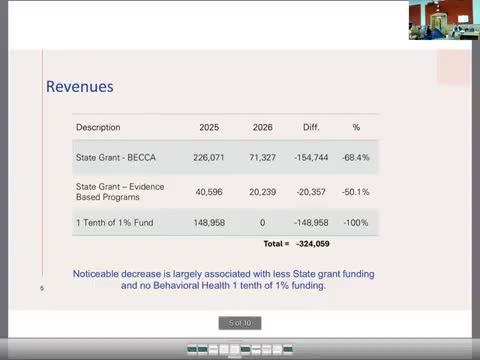Cowlitz County Superior Court seeks smaller judge-pro-tem budget, flags rising professional-service costs
Get AI-powered insights, summaries, and transcripts
Subscribe
Summary
Superior Court presenters told the Board of County Commissioners they are trimming Judge Pro Tem spending by $40,000 for 2026 but expect higher professional‑services costs tied to state‑mandated services and interpreter needs; therapeutic courts showed staffing shifts and revenue mixes that reduce general‑fund exposure.
Judge Marilyn Hahn, presiding judge of Superior Court, told the Cowlitz County Board of Commissioners that Superior Court is the county’s trial court and handles a broad caseload, including felony criminal matters, family law and adoptions. She said the court’s filings have been heavy this year and introduced budget presentations for the superior and therapeutic courts.
Danielle Pauls, Superior Court administrator, said the court is proposing a $40,000 reduction in the Judge Pro Tem line for 2026 because schedule and personnel changes have reduced the court’s use of pro tem judges. “We are asking to reduce that by 40,000,” Pauls said. She said the court left a contingency in the line because the state reimburses 50% of Judge Pro Tem costs when pro tems are used.
Pauls said the court is requesting an increase in its professional‑services line to cover growing, state‑mandated expenses including guardian ad litem services, court‑appointed attorneys, court visitors in minor guardianship cases and interpreters. The county receives partial reimbursements for some of those services, she said.
Dallas, therapeutic courts manager, said therapeutic courts’ budgets are primarily salaries and benefits. He said personnel shifts approved during the personnel workshop—moving some case managers to opioid‑funded positions—produce a reported reduction in general‑fund salary lines for 2026, with a commensurate reduction in internal services charges if those positions move to other funding sources.
Dallas described revenue sources that have funded therapeutic courts in recent years: mental‑health‑tax receipts (about $600,000–$630,000 in 2025), a DSHS grant (roughly $60,000) and other smaller grants (example noted as $20,000). He also said the county expects a transfer from a CJTA grant administered by the health and human services department; the presentation used a conservative placeholder (about $32,050) because the new grant award had not been finalized.
Commissioners asked whether internal‑service charges (IT, risk management, industrial accident) should move with the salaries if personnel are funded from opioid or other grants; staff recommended moving the corresponding internal‑service allocations to follow the personnel if those positions are charged to different funding sources.
Questions by commissioners and staff also touched on how interpreter and guardian ad litem reimbursements flow from the state and how uncertain mid‑year changes in state reimbursements could affect 2027.
Ending: Court administrators and the presenting judges said they would remain available to answer follow‑up questions as staff complete budget worksheets and revenues become clearer for 2027.
